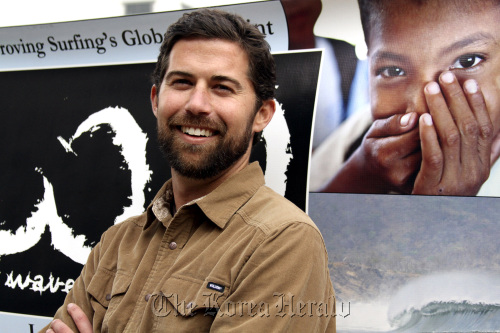SANTA CRUZ, California ― When Soquel, California, resident Nick Mucha was serving as a Peace Corps volunteer in 2004, he took a handful of surf trips, visiting friends who owned a surf camp in the small fishing village of Gigante, Nicaragua. Unbeknownst to him at the time, Mucha would effect change in that community in a significant way.
Mucha, an avid surfer, saw a community on the southwestern Pacific coast of the Central American country that was a virtual paradise for surfers ― beautiful setting, off the beaten track, world-class waves ― but whose locals weren’t benefitting from the influx of tourism dollars. Most families brought in about $4 to $7 per day, depending on that day’s fishing bounty, Mucha said, while most of the surfers’ money went to foreign-owned hotels ― there were three hotels in a community of about 450 people.
Mucha, 31, was moved to respond to the discrepancies. In 2005, he and fellow Peace Corps volunteer Adam Monaghan founded Project Wave of Optimism, or Project WOO, a nonprofit dedicated to facilitating community-development in Latin American surf travel destinations, owned and managed by community members. Gigante was their focus.
“I felt a need to employ the skills and knowledge I’d acquired to work with communities sitting on the brink of tourism,”Mucha said. “We saw a need in the world, and a void in surfers not stepping up.”
Project Woo’s first order of business was a community-wide census, which Mucha calls the cornerstone of the nonprofit’s work. Project Woo volunteers went door-to-door over a period of nine months, asking locals to identify their basic needs. Overwhelmingly, Gigante residents said that the village’s two biggest overall shortcomings were in education and transportation.
With a volunteer staff of two, Project Woo created a task force to work with community members, complete with team-building exercises and trainings on accountability. During an open town meeting, community members decided that they wanted a public bus, which would transport 35 high school students to a school more than 10 miles away, as there were no high schools in Gigante.
While community members were tasked with finding the proper permits, building a project proposal and choosing a bus ― ultimately, a converted coffee cargo bus ― Project WOO raised $40,000, which it provided to the community to buy the bus and train a local staff to operate it.
“We got an old coffee cargo truck and we turned it into a monster student mobile,” Mucha said.
Mucha said that a byproduct of the pilot bus project was an agreement with the Gigante families that, if Project WOO helped subsidize the students’ bus fares, the students would agree to attend an after-school program, which includes gardening, art classes and self-esteem training.
Mucha works full-time as a program specialist at Santa Cruz, California-based Ecology Action, before heading home to work on Project Woo in his off hours ― he doesn’t take a salary from Project WOO. He said he thinks the nonprofit was the perfect cross-section of his life and skills and the world around him. His second full-time job is a labor of love, Mucha said.
“Working in the Peace Corps really did spark a deep passion for social change and social justice in me,” Mucha said. “Surfing is a passion, and Latin America is a region of the world that’s really important to me.”
Stephen Leinau, a Santa Cruz resident, traveled to Gigante in 2009 and had an opportunity to assist with Project WOO observing firsthand the town’s new public bus at work.
“It was a really creative response to the community’s need,” Leinau said. “Gigante is isolated in terms of the road, and it becomes more isolated in the wet season. The chance for kids to go to high school is really dependent on that bus.”
 |
Santa Cruz surfer Nick Mucha founded Project Woo, a program that facilitates developments in Latin American surf travel destinations. (Santa Cruz Sentinel/MCT) |
Leinau, executive director of Earth Links ― a Santa Cruz organization that provides consulting services to nonprofits ― said Mucha is inspirational in his engagement, having created a “unique and successful project.”
“There’s some real similarities between the community of Gigante and Santa Cruz, in that we’re both close to the coast and surfing is important to us,” Leinau said. “Nick is making it possible to go and explore another community in a way that we’d never get the chance.”
Mucha said Project Woo is always looking for more surfers to participate in its “Surf and Serve” program on trips through Nicaragua. He recently sent a new programs manager to Gigante, who is staying with a host family and is planning a new community census.
“We’re now at the point where we have our programs stabilized and we have a couple of avenues for people to participate,” Mucha said. “We’re trying to reach out to people and say, instead of just surfing your brains out, you have an opportunity to dig into the cultural fabric and give back to these communities.”
By Jory John
(Santa Cruz Sentinel )
(McClatchy-Tribune Information Services)








![[Today’s K-pop] Blackpink’s Jennie, Lisa invited to Coachella as solo acts](http://res.heraldm.com/phpwas/restmb_idxmake.php?idx=644&simg=/content/image/2024/11/21/20241121050099_0.jpg)